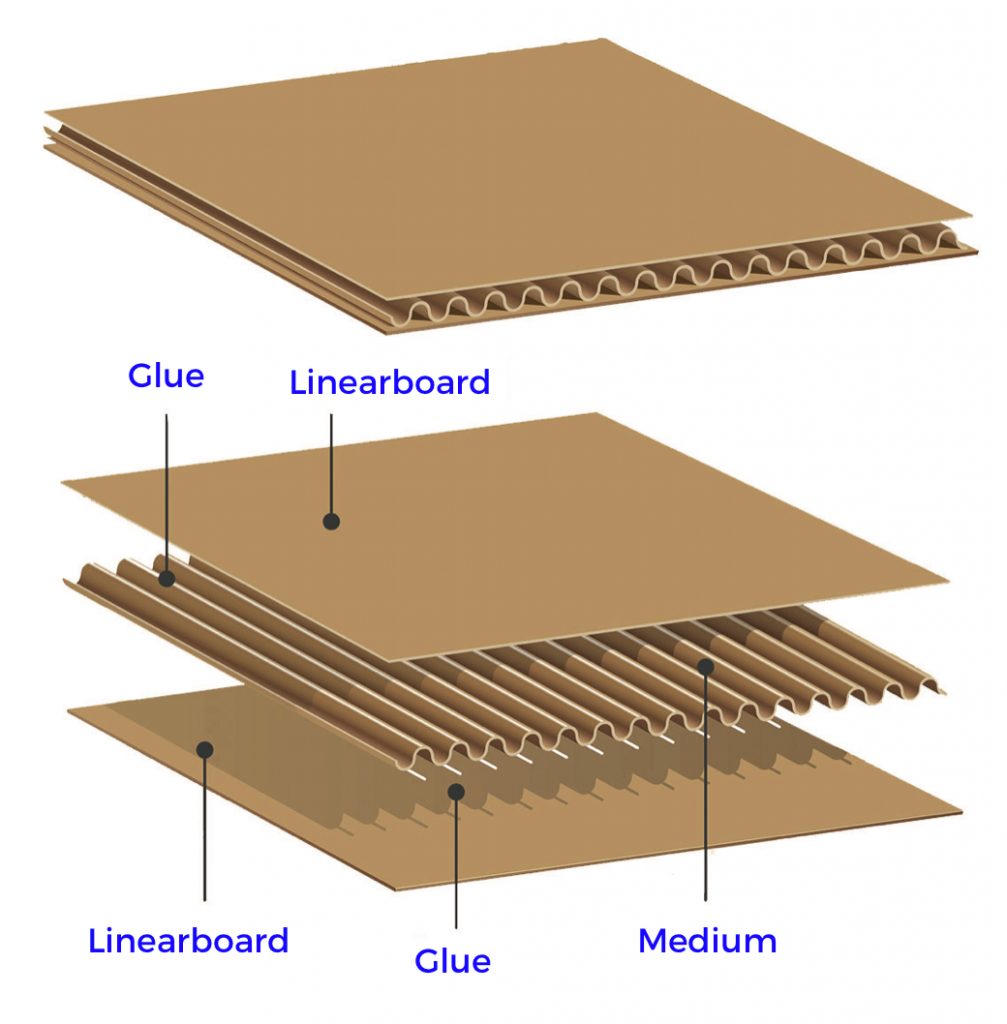Not sure what Packaging Flute and Board grades to use?
Packaging Flute and Board grades are essential in determining what materials are best to use. When planning your corrugated cardboard container, we will work with you to determine the strength required of the fluted material.
Some of the questions that need to be considered when choosing the correct materials are;
• The nature of the products being packaged
• The total weight of the box
• The size of the box
• How the cardboard box will be stacked, stored, and transported.
• Print-ability

Corrugated boxes are paper-based and display a fluted corrugated sheet between liner board.
The material flute is the corrugated or curved section between the two liners, and by changing its height, it’s possible to achieve different performance characteristics in the cardboard.
Corrugated flutes are designed to provide corrugated packaging with extra layers of insulation and protection. They also help make the packaging crush-proof and puncture-proof. Corrugated flutes help provide structure to corrugated boxes, so they support heavier items without folding or breaking.
Flute is categorised by the thickness of the paper being folded (fluting paper). This can range from single-walled flutes, which are smaller flutes but provide better printability and foldability. Larger flutes, which are typically double-walled flutes and above, provide greater strength and cushioning, making them ideal for shipping. Smaller flute profiles provide enhanced structural and graphics capabilities for use in retail packaging.
Different packaging flute profiles can be combined in one piece of combined board. For example, a triple-wall board may contain one layer of A-flute medium with two layers of C-flute medium. Mixing flute profiles allows designers to adjust the compression strength, cushioning strength and total thickness of the combined board.
Using double-walled material, manufacturers can combine one or more flutes to create a grade such as “EB” or “BC” flute. Combining one or more material flutes can have several purposes, including improving the outer appearance of a printing surface and creating a rigid structure that’s perfect for more substantial items.
If you are unsure of what packaging flute or board grade to use and need some help, Our friendly team would love to assist! Contact us today and we will walk you through the best options.
Board Styles
Single Face Board
Single face board has only two layers, a liner layer and a corrugated layer. It’s not as durable as the other types of corrugated cardboard but is often used inside of boxes to add extra cushioning.
Uses: Void fillers and mailing cartons. inner packaging to separate and protect individual products inside the outer packaging.
Single Wall Board
Single wall board is the most common type of corrugated cardboard. If someone is talking about corrugated cardboard, they are most likely referring to this style. It consists of two outer liners and a middle layer of corrugated medium.
Uses: Shipping Cartons
Double Wall Board
Double wall board has two layers of corrugated fluting and three liners, making it extremely durable.
Uses: Industrial cartons
Triple Wall Board
Triple wall board sturdy enough to be used in place of wooden crates. Three layers of fluting make this corrugated cardboard a dependable choice for shipping chemicals or items that need special handling.
Uses: Shipping crates, chemical containers
Packaging Flute Board Grades
A- Flute
4-5mm thickThe thickest flute. It’s ideal for extra cushioning and shock absorption – Great stacking strength.
Not ideal for boxes that need print intricate designs.
Uses: Shipping boxes and packaging fragile items. Commonly used for structural strength.
B- Flute
2- 3mm thickGood Puncture resistance, Less stoarge space consumption. High quality surface for printing & diecutting. Most common for mailer Boxes.
Uses: Small products, canned goods and displays.
C- Flute
3.5- 4mm thickMost popular, Standard for RSC boxes, Provides a good stacking strength and crushing resistance.
Uses: Glass, furniture and food. Common for shipping cartons.
E- Flute
1 -2mm thickLightest Weight, Ideal for printing, Easy to fold. Excellend for Custom Diecut boxes. Often used for litho laminated fluted cartons
Uses: E-commerce, Small boxes, Displays.
C/E- Flute
4mm thickUses: Produce trays, medical boxes.
Industrial dried goods when need more industrial strength
BC- Flute
5-9mm thickUsed where products are heavier and bulkier or where the product requires a higher degree of protection. Has exceptional stacking strength and puncture resistance.
Uses: Shipping heavy items and industrial applications.
Packaging Flute Type and Board Grades FAQ
What does the term “flute” in packaging mean?
The wave-shaped structure used to strengthen and support corrugated cardboard is known as a flute. These flutes serve as insulation for the package’s contents as well as assistance with cardboard strength to enable stacking.
What type of Packaging Flute should I use for my box?
It all depends on the weight of the product, How it will be stored and transported, Design and Type of Box. We can help you determine all of these to come up with the perfect packaging solution for your product!
What size is a packaging flute?
A flute is the thickest corrugated flute available, measuring about 5 millimetres or ¼ inch in thickness. This means that there are about 36 flutes within a single linear foot of packaging. An A flute is ideal for fragile items that need extra protection, thanks to extra-thick fluting.
